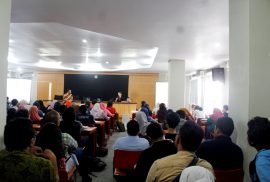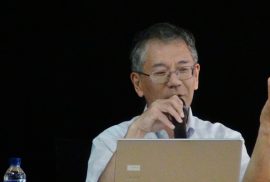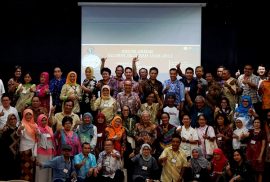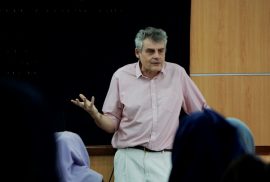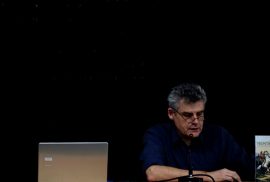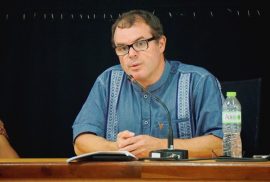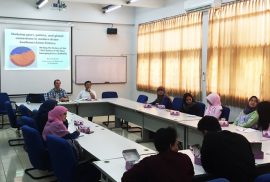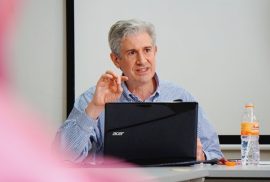Layar proyektor memutar sebuah film dokumenter. Terlihat dalam film itu, seorang lelaki tua sedang diwawancara terkait pengalaman perang. “Pokoknya masa itu saya tidak tenang, tidak aman” katanya. Ia adalah seorang mantan veteran –yang dulunya seorang petani- yang turut berjuang dalam perang revolusi 1945-1949. Veteran itu mengatakan bahwa ia bangga dengan apa yang sudah dilakukan. Ia mengungkapkan perjuangannya dalam mempertahankan kemerdekaan. Kisahnya adalah kisah perjuangan. Tidak berselang lama sebuah film dokumenter lain diputar. Kali ini yang ditampilkan adalah seorang lelaki warga negara Belanda. Usianya hampir sama tua dengan lelaki pertama. Tetapi yang jelas, ia juga adalah veteran perang. Dulu ia tergabung dalam pasukan yang membonceng NICA untuk melakukan agresi militer. Ia menangpak para pejuang kemerdekaan. Namun, dalam penuturannya ia merasa bersalah atas tindakannya. Dalam pandangannya, apa yang dilakukan Belanda terutama pada 1945-1949 tidak bisa dibenarkan. Dua film itu menunjukkan ada dua perspektif berbeda dalam membaca sejarah ketika masa revolusi.
Isu penduduk cukup mendapat perhatian akhir-akhir ini. Di Indonesia, menurut laporan LIPI, pada 2020-2030 nanti, Indonesia akan mendapat bonus demografi. Berdasarkan perhitungan, pada rentang tahun itu proporsi jumlah penduduk Indonesia mengalami tingkatan yang baik jika dilihat dari segi ekonomi. Jumlah penduduk usia produktif (17-64 tahun) akan lebih banyak dari usia non-produktif. Perbandingannya menyentuh angka 70 banding 30 persen. Hal ini berbanding terbalik dengan keadaan yang ada di Jepang. Kurva penduduk di negeri ‘matahari terbit’ itu membentuk segitiga terbalik. Jepang mengalami beban penduduk usia senja yang banyak.
Sabtu pagi (18/3) suasana pelataran gedung Purbatjaraka Fakultas llmu Budaya UGM mendadak ramai. Beberapa orang terlihat bersalaman lalu tertawa. Tidak sedikit pula yang berpelukan. Hari itu Departemen Sejarah UGM menggelar Reuni Akbar. Acara itu dihelat selama dua hari yakni 18-19 Maret bertempat di Fakultas Ilmu Budaya UGM. Peserta terdiri dari alumni sejarah berbagai angkatan dan strata. Panitia penyelenggara -yang terdiri dari beberapa inisiator dari kalangan alumni- mengusung tema “Masa Lalu Selalu Aktual”.
Orde Baru menjadi materi penting dalam kajian sejarah Indonesia kontemporer. Bukan saja karena lama waktu kekuasaan –yakni 32 tahun. Akan tetapi Orde Baru memberikan satu warisan sejarah, yang sampai sekarang masih dirasakan. Bahkan pada beberapa kasus warisannya malah diproduksi kembali pada masa reformasi –setelah Orde Baru tumbang. Meski begitu yang menjadi menarik bagi peneliti adalah bagaimana skema negara Orde Baru bekerja. Sejarawan UGM, Farabi Fakih, dalam disertasinya menyebut Orde Baru adalah Managerial State. Suatu terminologi yang menunjukan bahwa Orde Baru bekerja layaknya korporasi.
Peter Boomgaard menjadi penting dalam perkembangan historiografi Indonesia. Bagi beberapa sejarawan kepakarannya dalam memelopori sejarah lingkungan merupakan perlawanan. Ia memberikan alternatif historiografi arus utama –yang dulu cenderung militeristis dan politis. Mengapa historiografi lingkungan ini menjadi unik? Gagasan Boomgaard tidak lagi menempatkan relasi manusia antar manusia -yang menjadi corak historiografi politis, militer, atau pun pada perkembangan selanjutnya sosial. Sejarah bukanlah perihal perang, dan kekuasaan. Peter Boomgaard tidak menihilkan peran manusia, karena manusia merupakan elemen penting dari sejarah. Akan tetapi, -melalui ide sejarah lingkungan- ia mempunyai gagasan bahwa sejarah juga adalah relasi manusia dengan alam. Maka sejarah mempunyai kemungkinan interdisipliner yang lebih luas, bahkan termasuk ranah sains tidak lagi terpaku pada pendekatan ilmu sosial saja. Maka sejarah bisa membahas tentang relasi manusia dengan alam : interaksi dengan fauna, bencana alam, dan sejarah tentang wabah penyakit.
Masih sangat jarang, dalam historiografi Indonesia pada khususnya yang membahas olah raga sebagai topik kajian sejarah. Berpijak dari hal itu, Departemen Sejarah FIB UGM mengadakan kuliah umum secara beruntun. Masing-masing pada Jumat (10/2) dan Senin, (13/2). Kuliah umum mengundang Dr. Russell Field dari University Of Manitoba. Ia adalah assisten Profesor yang menggeluti tema olah raga, khususnya relasi olah raga dan politik. Pada pertemuan pertama, Jumat (10/2), Dr. Russel lebih menyoroti olah raga dan historiografi.
Dr. Russell Field, pada Jumat (10/2/2017) berkesempatan hadir untuk mengisi kuliah umum di Ruang Sidang I, Gedung Purbatjaraka Fakultas Ilmu Budaya UGM. Asisten peneliti dari University Of Manitoba Canada, itu memberi kuliah umum dengan tema “Studying Sport, Politics, and Global Conection ”. Acara itu diselenggarakan oleh Departemen Sejarah Fakultas Ilmu Budaya UGM. Kuliah umum itu adalah pertemuan pertama, dari rencana dua kuliah umum yang akan diselenggarakan tentang olah raga dan sejarah.
Dr. Russell membicarakan tentang relasi olah raga dan perkembangan politik global kala 1963. Dia berangkat dari penelitiannya tentang Games Of New Emerging Force (Ganefo). Pesta olah raga itu dihelat di Jakarta pada 1963 atas prakarsa Presiden Indonesia saat itu, Soekarno. Meski begitu Russell tidak begitu mendalam memaparkan tentang Ganefo. Ia memfokuskan pembahasan pada olah raga sebagai subjek penelitian sejarah.
Kajian sejarah perkotaan menjadi menarik akhir-akhir ini. Kota pada bagian tertentu mempunyai roh. Ia bisa menjadi cerminan, atau pun perwujudan visi. Meski begitu kota pun menyimpan banyak masalah yang perlu untuk dikaji lebih mendalam : pemukiman kumuh, penataan kota, penduduk, dan masalah lingkungan perkotaan yang kerap muncul. Melihat prospek kajian sejarah perkotaan yang bagus dan relevan dengan perkembangan zaman. Departemen Sejarah FIB UGM, pada Senin (16/01/2017) mengadakan kuliah umum dengan tema “Land, Lumber, Labor, and Excrement : The Circular Economy of Nineteenth Century Tokyo Tokyo Slums’. Kuliah umum mengundang pemateri dari Georgetown University, yakni Prof. Jordan Sand, bertempat di Gedung Purbatjaraka, lantai I, FIB UGM.

